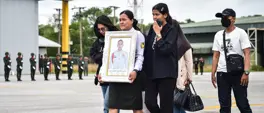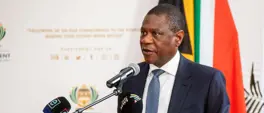CAMAGWINI MAVOVANA: Lessons from Diddy & Gisèle Pelicot | Media must do better when reporting on rape, GBV
Camagwini Mavovana
26 September 2024 | 8:24The media plays a vital role in shaping how we understand, process, and respond to cases of rape, sexual assault, and gender-based violence – but more often than not, the sensationalist tendencies of the media fail to centre the voices of victims, writes Camagwini Mavovana.
The recent cases involving Sean "Diddy" Combs in the United States and Gisèle Pelicot in France demonstrate the profound ways that media coverage can detract from the gravity of abuse and place unnecessary focus on scandal, ultimately hindering justice, and silencing survivors.
In Diddy's case, news outlets have overwhelmingly focused on the lurid details of his alleged "Freak Off" parties, his connections to celebrities, and the stockpile of baby oil discovered at his home.
While these details certainly capture attention, they distract from the fact that, for decades, Combs has been accused of orchestrating a horrifying network of sexual crimes that allegedly involved trafficking, forced labour, and extensive psychological manipulation.
His victims are often overshadowed by headlines designed to titillate rather than illuminate the trauma they endured. In sensationalising these stories, the media obscures the true narrative: the power dynamics, exploitation, and lives irreparably damaged by abuse.
Equally troubling is how the industry has perpetuated a culture of silence around these behaviours.
Diddy is a music mogul who had immense influence for years, and many of his peers in the entertainment industry knew about his predatory tendencies, but did nothing.
Celebrities who once rubbed shoulders with him are now distancing themselves, but the question remains - why did they stay silent when they knew something was wrong? This is where the media must step in, not only to hold perpetrators accountable, but also to examine the complicit networks that enabled such abuse to continue for decades.
What is needed is an investigative approach that places survivors at the centre and critiques the systems that protected men like Diddy.
The trial of Gisèle Pelicot in France offers a parallel story, highlighting the disturbing ways the justice system and media can both fail survivors.
Gisèle's husband, Dominique Pelicot, and 50 other men are currently on trial for raping her while she was unconscious after being drugged with sleeping pills. Rather than focusing on the unimaginable trauma she endured, some media outlets have attempted to shift the narrative by suggesting that Gisèle was complicit in her own abuse.
The defence's claim that "there is rape, and then there's rape" not only trivialises her experience, but also dangerously undermines the definition of consent.
In her testimony, Gisèle pointedly asked, "When you see a woman deeply asleep on her bed, isn't there a moment when you wonder, ‘Isn't there something wrong here?’" Her words cut to the heart of the issue: how can anyone argue that rape is excusable or less egregious depending on the circumstances?
Yet despite her unwavering courage to speak out, Gisèle still finds herself battling not only her abusers, but also a narrative that seeks to discredit her and frame her as an accomplice to her own suffering.
Adding another layer to this conversation is Cassie’s story - a survivor who has bravely shared her experiences with “Diddy”.
Cassie embodies resilience amidst adversity; however, her journey has also been marred by sensationalist media coverage often prioritising scandal over substance. Cassie blew the lid off Diddy's abusive behaviour through her recent allegations and lawsuits against him. Her courage in coming forward not only shed light on her own suffering, but has also prompted others to speak out about their experiences.
Without Cassie’s voice demanding accountability from one of hip-hop's most influential figures, many of these disturbing truths might have remained hidden. Her experiences exemplify how critical it is for media representations to honour survivors’ strength, rather than reduce them to victims defined solely by their trauma.
The media’s role here should be to expose this injustice. Instead of perpetuating harmful stereotypes that blame victims or trivialise their experiences, journalists should use their platforms to shine a light on systemic failures that allow such abuses to continue.
Gisèle’s story - like Cassie’s and Diddy’s victims - should be one of survival and resilience, rather than one overshadowed by tabloid-style reporting designed only to shock.
The parallels between these cases reflect broader issues within media portrayals of gender-based violence. Too often, coverage shifts focus away from perpetrators toward salacious details that detract from the human cost of abuse.
This is not only irresponsible journalism, but also harmful to victims who are left reliving their trauma in public while receiving little empathy or justice.
In both Diddy’s and Pelicot’s cases, there is a dangerous tendency to blur the lines between real news and sensationalised stories. The media should not create a spectacle out of tragedy; it must uphold its responsibility to report facts while centring survivors' voices.
When stories about powerful men like Diddy are told with an emphasis on scandal rather than accountability, or when survivors like Gisèle are painted as complicit in their abuse, it becomes easier for society to dismiss these crimes' seriousness.
What can be done to rectify this?
First, the media must prioritise respectful, trauma-informed language when reporting on GBV. Words matter - jokes, salacious headlines, and graphic details can re-traumatise survivors and downplay crime severity.
Second, journalists need to identify complicity within specific industries better. In Diddy’s case, his power enabled alleged actions to continue unchecked for years, much like Hollywood and politics have shielded powerful men from accountability.
Moreover, legal systems need scrutiny regarding how they treat survivors. As seen in Gisèle's case, even when guilt is evident, defence strategies often aim to further victimise survivors by questioning their morality or complicity in abuse.
The media can serve as an essential watchdog, ensuring survivors are treated with dignity while helping the public understand consent's true nature.
Finally, survivors deserve to be heard without judgment or distortion. They deserve a media that advocates for justice, not one fueling misogyny or minimising experiences for headline-grabbing sensationalism.
At a time when GBV is being more widely recognised, the media has an opportunity and an obligation to be part of the solution rather than part of the problem.
Both Diddy’s and Gisèle’s cases reveal how much work remains. The media must evolve and recognise that reporting on GBV is not just another story but a critical responsibility in shaping public opinion and influencing justice.
Survivors like Gisèle and Cassie deserve nothing less.
Camagwini Mavovana is a gender scholar/activist, journalist and content producer.

















